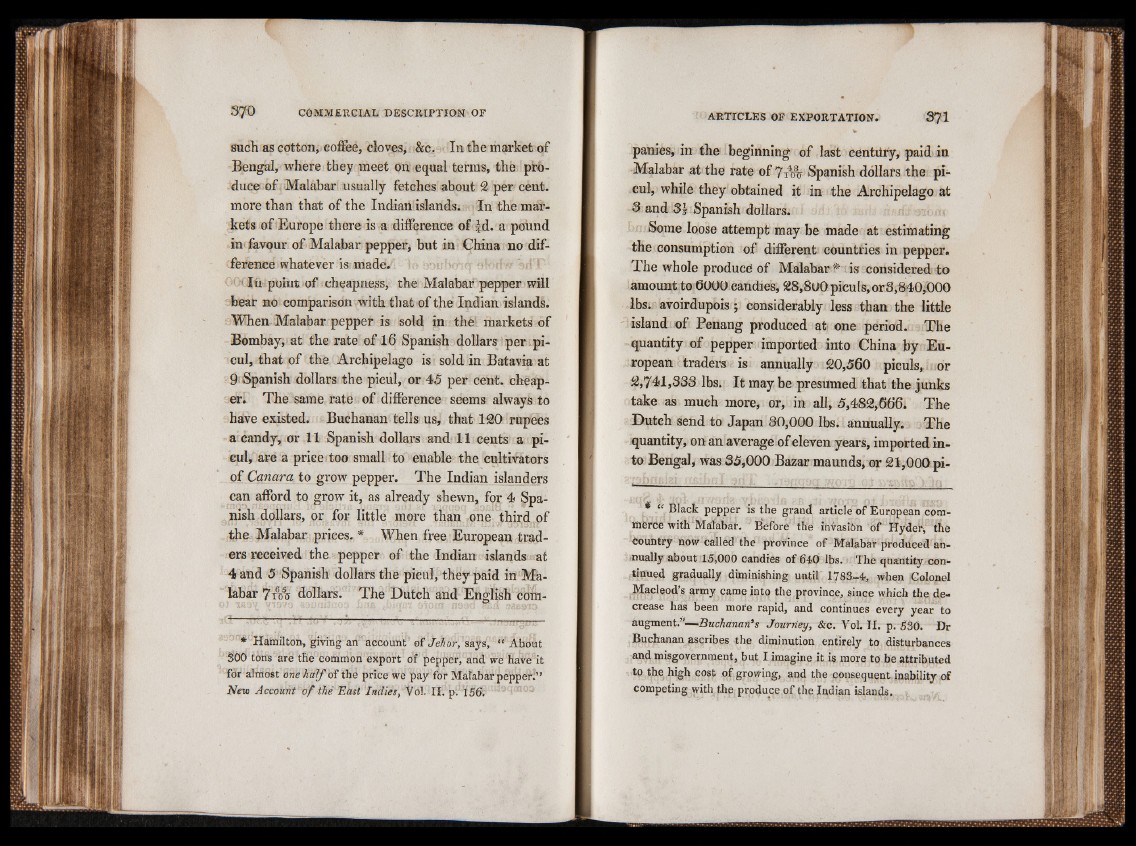
such as cotton, coffee, cloves, &c. In the market of
Bengal, where they meet on equal terms, the produce
of Malabar usually fetches about 2 per cent,
more than that of the Indian islands. In the markets
of Europe there is a difference of *d. a pound
in favour of Malabar pepper, but in China no difference
whatever is made.
In point of cheapness, the Malabar pepper will
bear no comparison with that of the Indian islands.
When Malabar pepper is sold in the markets of
Bombay, at the rate of 16 Spanish dollars per picul,
that of the Archipelago is sold in Batavia at
9 Spanish dollars the picul, or 45 per cent, cheaper.
The same rate of difference seems always to
have existed. Buchanan tells us, that 120 rupees
a candy, or 11 Spanish dollars and 11 cents a picul,
are a price too small to enable the cultivators
of Canara to grow pepper. The Indian islanders
can afford to grow' it, as already shewn, for 4 Spanish
dollars, or for little more than one third of
the Malabar prices. * When free European traders
received the pepper of the Indian islands at
4 and 5 Spanish dollars the picul, they paid in Malabar
7t¥tt dollars. The Dutch and English com*
Hamilton,, giving an'account of Jehor, says, “ About
300 tons are the common export of pepper, and we have it
for almost one half of the price we pay for Malabar pepper.”
New Account o f thè East Indies, Vol. II. p. 1561.
panies, in the beginning of last centilry, paid in
Malabar at the rate of 7t4to Spanish dollars the picul,
while they obtained it in the Archipelago at
3 and 3f Spanish dollars.
Some loose attempt may be made at estimating
the consumption of different countries in pepper.
The whole produce of Malabar* ; is considered to
amount to 6000 candies, 28,300 piculs, or3,840,000
lbs. avoirdupois; considerably less than the little
island of Penang produced at one period. The
quantity of pepper imported into China by European
traders is annually 20,560 piculs, or
2,741,333 lbs. It may be presumed that the junks
take as much more, or, in all, 5,482,666. The
Dutch send to Japan 30,000 lbs. annually. The
quantity, on an average of eleven years, imported into
Bengal, was 35,000 Bazar maunds, or 21,000 pi-
I* -‘li Black pepper is the grand article of European com-
tìièrce with Máfabár. before the invasión of HyderV thè
èoufitry now called the province of Malabar produced annually
about 15,000 candies of 640 lbs. The quantity continued
gradually diminishing until 1783-4, when Colonel
Macleod’s army came into the province, since which the decrease
has been more rapid, and continues every year to
augment/'—‘Buchtinaii’s Journey, &c. Vol. II. p. ¿30. Dr
Buchanan ascribes the diminution entirely to disturbances
and misgovernment, but I imagine it is more to be attributed
to the high cost of growing, and the consequent inability of
competing with the produce of the ludían islands.